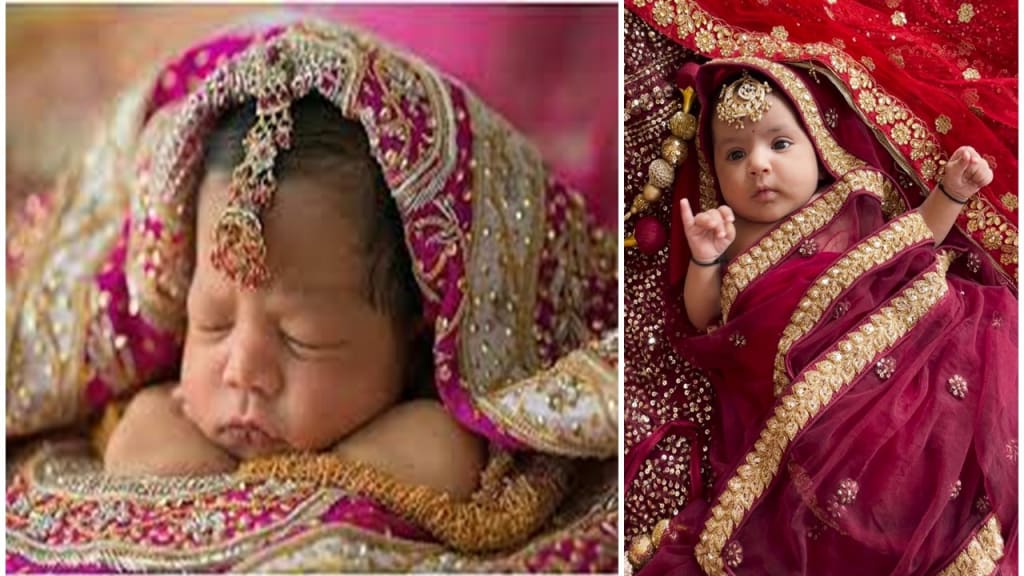Childhood Engagement
An Age-Old Tradition of Punjab and Its Evolution

Childhood engagement, also known as "bal mangeva," is an age-old tradition that was once prevalent in Punjab, a culturally rich region in India. This custom involved sentimental women holding a newborn girl in their arms and expressing their heartfelt desire that she would grow up to marry their son and become their cherished daughter-in-law. If the girl's parents agreed to the proposal, sweets would be distributed among the gathering, symbolizing the acceptance of the engagement. However, as society has evolved, these rituals have come under scrutiny due to their potential implications and are increasingly considered outdated in contemporary times. In this article, we will explore the origins, significance, and the shift in perspective regarding childhood engagement in Punjab, shedding light on its implications and the reasons for its diminishing practice.

Historical Context and Significance
Childhood engagement holds its roots in the rich historical and cultural fabric of Punjab. Traditionally, Punjab has been a patriarchal society with deep-seated customs and traditions that governed social relationships and marriages. The practice of childhood engagement was primarily driven by sentiments of affection, love, and the desire for long-lasting bonds between families.
The ritual typically took place within the close-knit community, where relatives, neighbors, and friends would come together to celebrate the birth of a newborn. Sentimental women, often close relatives or family friends, would hold the newborn girl in their arms, expressing their heartfelt wish that she would grow up to marry their son. This act served as a symbolic gesture of their deep affection and desire to extend their family ties.
If the girl's parents found the proposal favorable and agreed to it, sweets would be distributed among the gathering as a mark of acceptance. This act not only reinforced the emotional bond but also signified the acknowledgment of the future alliance between the families.
Changing Perspectives and Issues
Over time, the practice of childhood engagement has undergone significant scrutiny and has come to be viewed as potentially problematic and outdated. Several factors have contributed to this shift in perspective and the decreasing prevalence of the custom:
Autonomy and Consent:
One of the key concerns associated with childhood engagement is the lack of autonomy and consent for the individuals involved, particularly the young girl. This tradition often imposes societal expectations on children, denying them the right to make choices about their future and partner.
With a growing emphasis on individual agency and personal freedom, there is a greater recognition of the importance of consent in relationships. This awareness has led to a reevaluation of childhood engagement, as it violates the fundamental principle of allowing individuals to choose their life partners freely.

Child Rights and Well-being:
Childhood engagement raises questions about the well-being and development of the child involved. The practice may place undue pressure and responsibilities on the young girl, impacting her education, personal growth, and overall well-being. Premature engagements can disrupt normal childhood experiences and curtail opportunities for self-discovery and empowerment.
Child marriage, which can be an unfortunate consequence of childhood engagement, has been recognized as a violation of human rights by international organizations. Efforts have been made globally to eradicate child marriage and ensure the protection and well-being of children.
Evolving Gender Dynamics:
The shifting gender dynamics in society have also influenced the perception of childhood engagement. The traditional practice predominantly focused on securing a daughter-in-law for the son, reinforcing gender norms and expectations. However, as gender equality movements gain momentum, there is a growing recognition of the importance of equal partnership and mutual consent in relationships.
Promoting equal opportunities for both boys and girls to pursue education, career aspirations, and personal growth has become a priority. Consequently, the idea of pre-determining a girl's future through childhood engagement clashes with the vision of a more egalitarian society.
Contemporary Outlook and Changing Practices:
In recent years, there has been a noticeable decline in the practice of childhood engagement in Punjab. The aforementioned concerns regarding autonomy, consent, child rights, and evolving gender dynamics have played a significant role in this transformation.
The awareness and advocacy efforts around child rights, education, and women's empowerment have contributed to changing societal attitudes. Parents and communities are increasingly prioritizing the well-being and personal development of their children, allowing them the freedom to choose their life partners when they reach a suitable age.
Moreover, legal measures and campaigns against child marriage have further strengthened the movement against childhood engagement. Legislative reforms and initiatives aimed at raising awareness about the harmful consequences of early marriages have gained momentum, creating a more supportive environment for girls' education and delayed marriages.
In addition, the wider availability of educational opportunities and exposure to different cultures and perspectives has broadened horizons and influenced societal norms. The younger generation, particularly in urban areas, is more inclined towards making independent choices in matters of marriage and relationships.
Conclusion:
Childhood engagement, once a cherished tradition in Punjab, has faced growing scrutiny and declining practice in recent years. The concerns surrounding autonomy, consent, child rights, and evolving gender dynamics have led to a shift in societal attitudes and the recognition of the potential problems associated with this practice.
While it is essential to understand and respect cultural traditions, it is equally important to ensure the well-being, autonomy, and rights of individuals, especially children. The declining prevalence of childhood engagement reflects the evolving social fabric, where the emphasis is increasingly placed on individual agency, consent, and gender equality.
Efforts to promote education, women's empowerment, and the eradication of child marriage have been crucial in challenging and reshaping outdated customs. As society progresses, it is vital to create an environment that nurtures the development and choices of children, enabling them to determine their future with autonomy and free from restrictive traditions.
By recognizing the potential implications and challenges associated with childhood engagement, society can strive towards creating a more inclusive and equitable environment for all individuals, regardless of gender or age.
About the Creator
Dr. Amjad Ali Bhatti
Dr. Amjad Ali Bhatti is a multifaceted individual who has made significant contributions in the fields of research, translation, literature, and social activism.






Comments
There are no comments for this story
Be the first to respond and start the conversation.